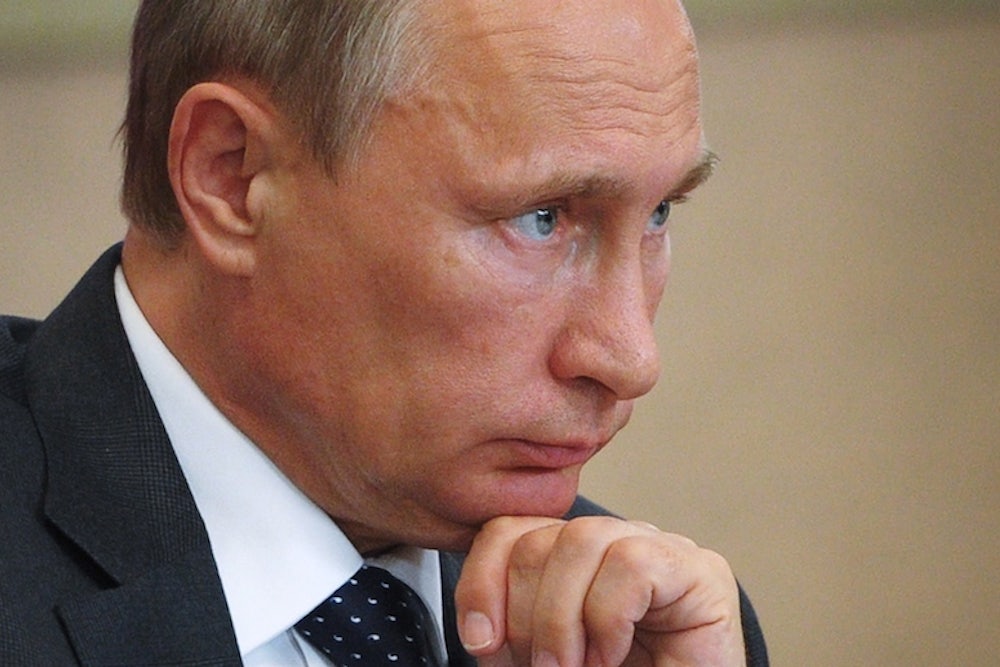“We do very little trade with Ukraine and, geopolitically … what happens in Ukraine doesn’t pose a direct threat to us,” President Barack Obama declared, almost offhandedly, last Saturday.
His assertion was not made at a major foreign policy forum. It was made in a private home in Baltimore at one in an endless string of political fundraisers, where high income swells pay big money for the novelty of later telling their friends they rubbed shoulders with the president and maybe got to pose a question to the commander-in-chief.
The president’s remark about Ukraine’s place in the geopolitical order was not widely reported. But what he said sent shockwaves through a late-night dinner I attended in Kiev last Saturday, where several hundred European, U.S., and Ukrainian government officials, businessmen, and experts, as well as the EU’s top leaders, were gathered for a major conference on Ukraine’s future.
The comment, too, was sure to have been noticed by President Vladimir Putin as a signal that, in the end, the U.S. is ready to accept Russia’s brutal assertion of a sphere of influence over Ukraine—a country in which Russian-backed violence has already claimed well over 5,000 lives.
To be sure, the President’s observation that Ukraine and an aggressive Russia are not a central U.S. geopolitical concern was surrounded by obligatory prose concerning U.S. commitment to mobilize on behalf of Ukraine and to uphold the international order. But the President’s fundamental point was clear. We don’t have a dog in this fight.
Let’s take on the logic of that claim. Is it not in the fundamental interest of the U.S. to interdict—with sanctions and military aid to Ukraine—a full-scale Russian invasion and occupation?
A Russian occupation of large parts of Ukraine would clearly threaten the stability and security of our NATO allies on Ukraine’s western border. Further, Ukraine is home to three gigantic nuclear power plant complexes, which could become dangerous battlegrounds with unpredictable consequences for nuclear safety. War could disrupt or destroy Ukraine’s energy pipeline network, which is the central mechanism through which more than half of Russia’s exports of gas and oil to Europe travels. Successful Russian expansion into Ukraine would increase the chances of further adventurism in energy-rich Kazakhstan, where an elderly President will soon physically fade from power. And Russia would be emboldened to exert even stronger influence over the policies of energy-rich Turkmenistan. Would these developments not be as significant in impact as the fate of Saudi, Iraqi, and Qatari oil and gas reserves?
And what of recent, aggressive Russian canards about the alleged mistreatment of ethnic Russians in the Baltic NATO states? Would an aggressive and expansionist Russia not be more be willing to launch new efforts to threaten those states, engaging our Article 5 NATO treaty obligations to directly enter into military operations?
In an October 2012 presidential debate, candidate Mitt Romney famously referred to Russia as the U.S.’s “top geopolitical threat.” Obama then rebutted him vigorously. But time proved Romney right. Yet, instead of accepting this self-evident fact today after Russia has annexed the territory of another European state, Obama cannot admit to getting it wrong. Intellectual vanity, likely, is at the root of his throwaway phrase, uttered needlessly on the cocktail circuit, without heed for the damage it could do at a precarious moment in embattled Ukraine’s negotiations with the Kremlin. Indeed, doesn’t the President’s errant comment threaten to undo all the U.S. has done to strengthen Europe’s spine on imposing strong sanctions?
With the stakes so high, the President should do something unique: swallow his pride and walk back his ill-timed foreign policy quip. Unless he really meant it as a direct signal to an increasingly power-hungry President Putin.
Tomorrow, President Obama will meet Ukraine’s President Petro Poroshenko. It will be a serious moment for sober statements. The U.S. president must do no less than praise Ukraine’s president for preparing significant concessions of autonomy and amnesty for brutal terrorists who have murdered and marauded on Ukraine’s sovereign Eastern territory, aided and abetted by Russian arms and soldiers.
But he also should clearly assert that Russia’s violent ingathering of the sovereign states that emerged from the former Soviet Union poses a grave geopolitical threat to security and the post–Cold War international order. And he should signal that the U.S. is prepared to ratchet up sanctions against the Russian state and offer Ukraine security assistance to ensure that it develops a strong deterrent against any foreign aggressors.
Today’s meeting of presidents is not a stop on the endless fundraising trail. It is a crucial moment for the restoration of a more stable order in the heart of Europe. It is the proper time for a U.S. statement that reflects this grave reality.
